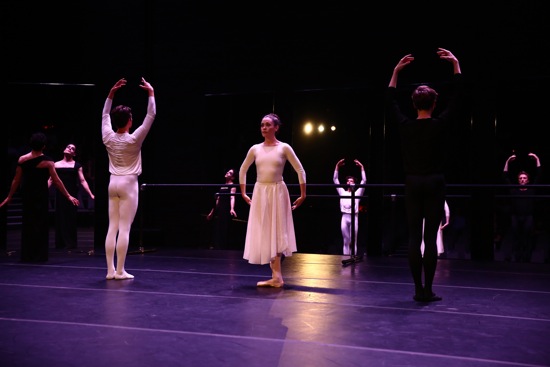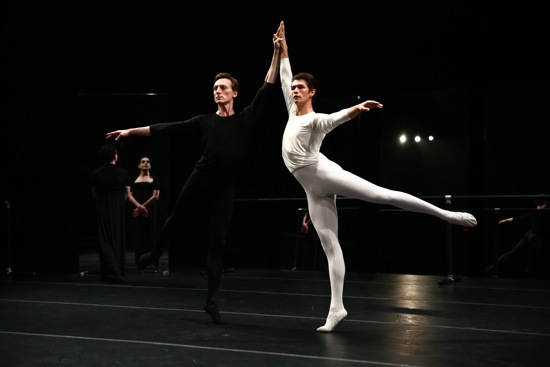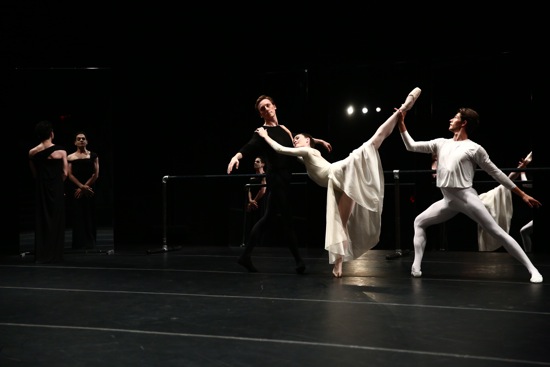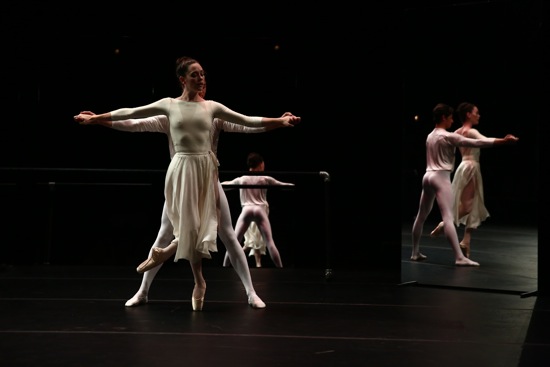The American Dance Institute presents Jack Ferver’s I Want You To Want Me.

Jack Ferver’s I Want You To Want Me. ( L to R): Jack Ferver, Barton Cowperthwaite, Carling Talcott-Steenstra, Reid Bartelme, and their reflections. Photo: Paula Court
What is this? The Kitchen looks different. Mirrors line the back wall and angle to either side. Barres are stretched along them, ready for a ballet class. We can look at ourselves, the reflected spectators—the innocent and the not-so-innocent—obedient and ready to contemplate, well. . .Hell (aka Jack Ferver’s I Want You To Want Me). Bring on the red lights and the smoke.
A figure completely shrouded in a stretchy black garment, except for its clawed hands, crawls onto the stage coughing. (People allergic to smoke should probable lead virtuous lives.) Ferverians in the audience are already laughing as the coughing escalates, and Ferver Fever catches on (look what it’s already done to my prose).
After Reid Bartelme in all-over black dance attire has helped the creature push back its hood and be revealed as Ferver, the latter, limping a bit, assists his assistant into some balletic bits. “I love you,” he says, and Bartelme looks self-satisfied. He has much to be satisfied about. Cue the recorded Tchaikovsky (his Symphony No. 6, the “Pathétique), and Bartelme (also, with Harriet Jung, the costume designer) embarks on a somber princely solo, interestingly choreographed but eventually satisfying everyone’s appetite for noble poses, leaps, and flying brisées, before the dancer collapses into a blackout (think Albrecht in Giselle, being forced to dance himself to death by the ghostly Wilis).
But, wait, there’s a plot, and Ferver has other roles to play. Facing the audience, he delivers a rueful speech as the wimpy boyfriend of Anne (Carling Talcott-Steenstra). He’s sorry she feels she has to go to France to further her career in ballet. He really wishes she wouldn’t leave home. Call this prophetic. She finishes her barre, says “I’m over America,” and exits the Kitchen’s performing space one one side, walks behind the audience, and re-enters on the other side, talking all the way about her nice train ride to Paris (I love this part). Somewhat confusingly, her teacher, (Ferver with his garment becomingly re-draped and his vampirish makeup more alarming), who has told her she’s a has-been, reappears as the doyenne of what appears to be a Paris studio.

Jack Ferver (back left) observes Reid Bartelmen (in black) and Barton Cowperthwaite (in white). Photo: Paula Court
Ferver, as writer, choreographer, and director of I Want You To Want Me—this world of dancers real and reflected—is handling several elements: a tragic plot, a send-up of ballets with tragic plots, and dancing that is skillfully made and interesting to watch, but on-and-off parodies ballet steps and conventions. It’s also performed extremely well. So you laugh and admire and are puzzled all at the same time. For instance, Bartelme and a second American visitor to the studio (Barton Cowperthwaite) perform a male duet that maintains mirror-image symmetry long past its sell-by date. If Cowperthwaite, all in white, lifts his left leg high, Bartelme will be lifting his right one; linked together, they negotiate difficult balances and execute so many well-placed ronds de jambe en l’air that you want to call out “enough!” They ask “Anne” if she thinks the duet is too abstract. “Oh no,” she says, “I loved it.” So they do a trio, and she says “wow, that was crazy!!”
Ferver, with his scarlet lips and heavily shadowed eyes, is not-so-subtly campy as the ballet mistress of the lower depths—uttering enigmatically lofty, Martha Graham-ish statements about dance and—just to show she’s French—occasionally translating a simple English word (for instance saying “danse” instead of “dance”), while reeling her/his important words out in impeccable English. Beginning work on a new pas de deux, “Madame M” channels a number of choreographers whose habit is to sketch out a few moves with a flourish of gestures, names, and half-assed footwork; then she runs off with a coughing fit (oh-oh).

I Want You To Want Me. (L to R): Jack Ferver and his reflections, Reid Bartelme, Carling Talcott Steenstra, and Barton Cowperthwaite. Photo: Paula Court
Naturally, “Bart” and “Anne” nod their heads, understanding her shorthand, and end up performing a surprisingly elaborate duet. Now comes the love story with a very bad ending. He, it turns out is an innocent from small-town America—strong and handsome (Brian Seibert of the Times aptly compared him to a Ken doll) and a splendid partner. They talk during the duet, and he proposes: “I love you!” She’s amazed, “What?” Their meeting is like a fairytale, he says, but better. They show off a bit; he accidentally drops her. She says in a quite natural, little-girl voice, “We’ve just met, I don’t fucking know you!” And within seconds, he’s down, and she’s covering him with black fabric, and he’s crawling off.

Carling Talcott-Steenstra and Barton Cowperthwaite in triplicate. Photo: Paula Court
Now she’s alone with the supposed “Madame M,” who outs herself as a 300-year-old. It’s this ballet-crazed demon’s birthday, and she announces sweetly that she craves someone’s soul as a gift. Anne says doubtfully that she doesn’t really believe in Hell. Really? Within minutes, she’s taken out her hairpins and is in full mad Giselle gear, whipping off killer entrechats. What’s left? More music (pieces by Arca vie with Tchaikovsky). Our choreographer as mistress of evil scuttles in with a tiny pot of red paint and stylishly bloodies Anne’s face; Bartelme as accomplice rolls the would-be ballerina in a sheet and drags her away. Bart rushes in to apologize to his beloved, and Ferver blows stuff into his eyes so he’ll mistake his nemesis for Anne. “You just seem different,” he opines during a not-so-good pas de deux, and rebels. Unsuccessfully. Agonizing on the floor to heavy chords, he gets the red paint treatment and. . . did the queen of pain just slurp some off the body??
“Change the fucking music,” she/he demands. Red lights blaze, smoke arises. But, quick, a reality check: the two corpses sit up to watch the other two rejoice. I can hardly make out what Bartelme says quietly to Ferver just before the lights go out. I think it’s “Wasn’t that fun?” And, yes, despite some structural peculiarities, I Want You To Want Me most definitely was.

Your review is fun to read, Deborah. Thank you. I needed that.
This sounds both amazing and hard to believe that it was created and performed in NYC (and at The Kitchen, no less)! Parody of ballet is so often done badly– this seems to have been pulled off really well (professionally, skillfully). I wish I could have seen it live, in-person!